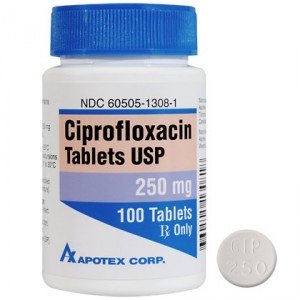Cipro is broad-spectrum antibiotic, which covers gram-positive and gram-negative aerobic and anaerobic organisms. It is successfully used to treat systemic infections (except CNS infections) caused by sensitive to it bacterial pathogens: respiratory tract, ENT, eyes, urinary tract and gynecological infections, sexually transmitted diseases, including gonorrhea, abdominal and gastrointestinal tract, skin and soft tissues infections, osteomyelitis, septic arthritis, peritonitis, sepsis, septicemia.
[ithshop code=”cipro” tpl=”short” page_id=”872″ dummy=”txt”]

Indications
Cipro belongs to the fluoroquinolone group and is actively used for many years. Its main mechanism of action – the destruction of a specific enzyme (DNA gyrase), responsible for bacterial cells division. The antibiotic also destroys gram-negative bacteria cell walls that are more resistant to other antimicrobial drugs from Canadian Pharmacy.
When do doctors prescribe ciprofloxacin? Indications for this antibiotic use are quite wide. These are infections caused by sensitive flora. In order to determine sensitivity, it is necessary to make a focus of the infection culture. Then, with the help of special discuses, we need to determine which medication can suppress the bacteria growth. This process is quite expensive and time-consuming – 2-3 days.
Its spectrum of action is quite wide. The preparation is used in drops, injections, pills. It depends on infection process location and severity. So let’s take a closer look at what diseases this antibiotic is prescribed for.
For many years, Cipro from Canada Pharmacy is successfully used in pulmonology. In most cases, it is the second-line drug, that is appointed in case of the ineffectiveness of other antibiotics. Basically, the pills or injections are used in acute chronic pulmonary diseases. These are chronic bronchitis, bronchiectasis and cystic fibrosis. Also, this medication has indications for use in severe respiratory infections such as lung abscess, pneumonia, pleurisy. In such cases, the antibiotic is prescribed primarily in an injectable form.
Canadian Cipro received positive reviews in ENT-practice as well. It is prescribed for chronic otitis, sinusitis. In ophthalmology and purulent conjunctivitis, eye drops are used.
The antibiotic has indications for use in urology. The drug treats chronic and acute pyelonephritis, cystitis, prostatitis in men. It became a first-line antibiotic for dysentery and salmonellosis treatment.
If we talk about the disease spectrum, this drug has more indications in surgery. It is successfully used in postoperative period, in peritonitis, gallbladder diseases treatment. Pills or injections are used for skin, soft tissues, bones purulent diseases. It is effective even in such severe condition as sepsis. Currently, many surgeons simply cannot imagine how to perform their practice without this antibiotic.
How to Take Cipro?
- Take the pills exactly as prescribed by your doctor. To clarify indications for use, contact your doctor or pharmacist.
- Take each dose with full glass of water (200 ml). Drink several additional glasses of water daily to prevent crystals formation in urine.
- Before each use, suspension for oral administration should be carefully shaken for about 15 seconds. Do not chew suspension microparticles, swallow them whole
 .
. - Do not powder, chew or crush the pills. Swallow them whole. Their composition is specifically designed for slow dissolution in the body.
- Cipro may be taken with food or on an empty stomach. It is recommended to take the drug twice a day after meals.
- Do not take this drug with dairy products (such as milk or yogurt) or calcium-enriched juice. The antibiotic can be used with products containing calcium, however, when the drug is used together with calcium-enriched milk or juice, its effect can be reduced.
- Take the pills at regular intervals.
- Do not take antacids that contain calcium, magnesium or aluminum (e. g., Tums or Rolaids); anti-ulcer sucralfate (Carafate); vitamins or food supplements containing calcium, iron or zinc at least six hours before receiving the drug and two hours after ingestion. Almost simultaneous drug intake with sucralfate, or vitamins or mineral supplements can significantly reduce antibiotic effects.
- It is necessary to take a full course of drug treatment. Improvement can appear before complete infection destruction.
- Store this medication at room temperature in a cool dry place.
Pills
Cipro pills are the most convenient form of taking this antibiotic. This is convenient and safe as it decreases chances of complications from the injection. The efficiency of the pills is not inferior to injections. In case of intestinal diseases, such form is more preferable since the antibiotic is delivered directly to the site of infection.
The pills are coated with a film to reduce the destructive action of gastric juice. Also, oral Cipro is sometimes placed in special capsules to protect it against digestive enzymes. One pill or capsule dosage may be different: 0.2 g, 0.5 g or 0.75 g. The most popular form of release is 0,5 g, as this dosage is most commonly prescribed by doctors.
Drops
Cipro eye drops are successfully used in ophthalmology. Antibiotic allows coping with many severe purulent eye diseases. It affects both gram-negative and gram-positive flora, bacteria rarely become resistant (insensitive) to it. The antibiotic has indications for use at acute and subacute bacterial conjunctivitis, blepharitis, corneal ulcers and chronic eye diseases. Very often, drops are used to treat and prevent septic complications in surgical ophthalmology.
The drops are produced in a 0,3% solution. Its color is yellow or yellow-green. The solution includes 3 mg of the active ingredient – ciprofloxacin hydrochloride. The drops also have some auxiliary substances in its composition, which act as stabilizers and solvents.
Analogs of Cipro
The analogs of this antibiotic are produced by many companies and in demand for several decades due to their efficacy, safety, and a relatively low price. The most important thing is that bacteria don’t practically develop resistance to this antibiotic. Canada Pharmacy sells numerous analogs of this preparation.
Cipro also has indirect analogs. These are antibiotics that belong to the same fluoroquinolones group but different generations. Difference between generations lies only in the range of sensitivity of different species of bacteria. Only a doctor can replace this antibiotic with an analog from another generation.
Posted by Dr. Himanshu Singh

 English
English Deutsch
Deutsch Français
Français Italiano
Italiano Español
Español Svenska
Svenska Português
Português 日本人
日本人 Dansk
Dansk Norsk
Norsk Suomi
Suomi Czech
Czech


